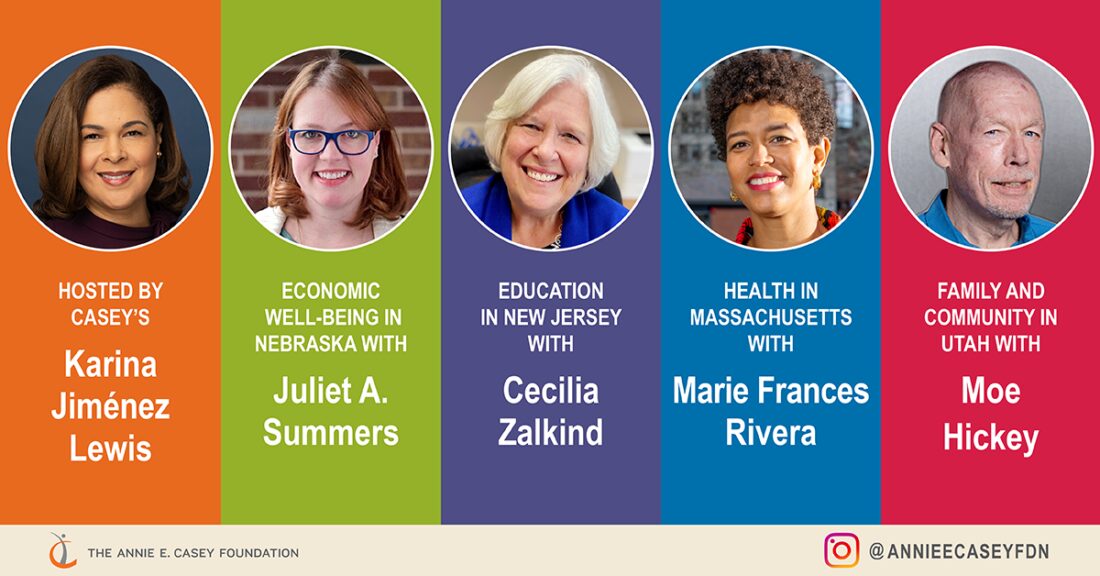Instagram Series Spotlights Child Well-Being Trends in Four States

The Annie E. Casey Foundation recently released the 33rd edition of the KIDS COUNT® Data Book*. The annual publication is packed with the latest child well-being trends, data insights and recommendations for policymakers. To explore its complexities, Karina Jiménez Lewis, Casey’s associate director of Policy Reform and Advocacy, invited four partner organizations to participate in a series of Instagram Live conversations called Domain Dives.
The 2022 Data Book opens with a foreword from President and CEO Lisa Hamilton, focused on how children in America are in the midst of a mental health crisis, struggling with anxiety and depression at unprecedented levels. It goes on to provide national and state data updates across four domains — economic well-being, education, family and community and health. States are ranked in each of the respective domains as well as for overall child well-being. This year, the top-ranked states were:
- Massachusetts — overall child well-being and health;
- Nebraska — economic well-being;
- New Jersey — education; and
- Utah — family and community.
Assigning a top spot is complex. It’s certainly an achievement and can offer insight into approaches that improve child well-being. However, it’s important to also remember the challenges that a state may face when looking at nuances such as disaggregated data, demographics or policies.
While each of the four Instagram Live conversations explored its state’s top domain ranking, they also covered:
- policy recommendations for other states;
- the effects of the COVID-19 pandemic on child well-being; and
- how future advocacy may be shaped amidst a child mental health crisis.
Watch the conversations below and follow the Foundation on Instagram.
Domain Dive: Economic Well-Being
Juliet A. Summers, executive director, Voices for Children in Nebraska
At Voices for Children, we see this ranking isn’t just a moment for Nebraskans to be number one, but a chance for us to dig in and say how can we move the needle more and make sure that when we say all kids deserve the good life, that we really mean all kids. And I want to be explicit that I’m talking about children and families and neighborhoods of color… I think one of our biggest blind spots if you look at our statewide overall ranking, Nebraska is a very majority white, non-Hispanic state and when we disaggregate these indicators by race and ethnicity we really get a much different picture for kids.
— Juliet A. Summers
Domain Dive: Education
Cecilia Zalkind, president and CEO, Advocates for New Jersey’s Children
We’ve looked a lot at the factors that contribute to school success. So, for example, we had a highly successful school breakfast campaign about 10 years ago. … We were among the worst states in the country to serve children breakfast, and [the] campaign ensured 100,000 more children had access…there are all kinds of factors like health and [parental] employment. New Jersey to me has always been sensitive to the academics, but also to the issues that impact school success.
— Cecilia Zalkind
Domain Dive: Health
Marie-Frances Rivera, president, Massachusetts Budget and Policy Center
In a state like Massachusetts where people think we’re doing well … if you dig even more deeply into that, some of the stats around Black and brown kids and Black young people specifically and how dire the findings were around their mental health was quite shocking and a wake-up call…one in five Black kids in Massachusetts is suffering from anxiety or depression and ranks us really low, in the bottom three across the nation, for Black kids and their mental health.
— Marie-Frances Rivera
Domain Dive: Family and Community
Moe Hickey, executive director, Voices for Utah Children
Utah in the big picture is not a hugely populated state and that’s an opportunity. … Let’s invest in children because that’s the best place as a state we can invest. If we can make sure that all our children are healthy, that they’re in a safe environment for child care, if they have access to proper education … these are very simple steps and we’re not that big that we can’t make sure that this does take place.
— Moe Hickey
Each guest represents an organization in the KIDS COUNT Network, whose members advocate in all 50 states, the District of Columbia, Puerto Rico and the U.S. Virgin Islands for smart, data-informed public policy promoting the well-being of young people. These four organizations work closely with the Foundation on data collection, advocacy and other child and family well-being strategies in their respective top-ranked states.
“These opportunities to chat with state leaders confirm once again that child well-being is complex,” says Karina Jiménez Lewis. “There are so many unique factors in each state and region, and sometimes data can only touch on so much — assuming there is enough of it. It’s important to reflect on what advocates see on the ground as we try to stabilize the rising anxiety and depression among the youngest members of our society. Our advocates in the KIDS COUNT Network are in the best position to know the data and policy context in their states, and we are deeply grateful for their expertise and influence.”





